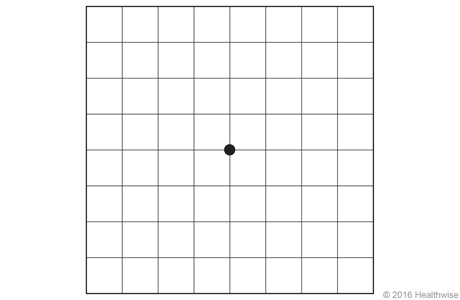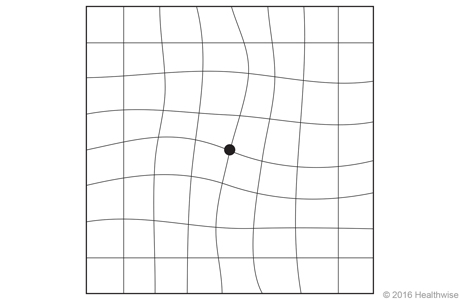Condition Basics
What is age-related macular degeneration (AMD)?
Age-related macular degeneration (AMD) is a disease that causes blurring of your central visioncentral vision. The blurring happens because of damage to the macula, a small area at the back of the eyeeye. The macula helps you see the fine detail in things that your eyes are focusing on.
Macular degeneration makes it harder to do things that require sharp central vision, like reading, driving, and recognizing faces. It does not affect side vision, so it does not lead to complete blindness.
There are two types of macular degeneration—wet and dry. The dry form is by far the most common type. The wet form is much less common, but it happens more quickly and is more severe.
You may have either type in just one eye, but over time you may get it in the other eye too.
What causes it?
AMD is the result of damage to the light-detecting nerve cells in the part of the eye called the maculamacula. The cause of the damage to the nerve cells is unknown. A person's genesgenes and family historyfamily history may play a role.
What are the symptoms?
The main symptom of AMD is dim or fuzzy central visioncentral vision. Objects may look warped or smaller than they are. You may have a blank spot in your central vision. Symptoms can depend on the type of AMD. Dry AMD happens slowly. Wet AMD happens suddenly and is more severe.
How is it diagnosed?
A doctor can usually detect AMD by doing a regular eye exam. The doctor will ask about your symptoms, past eye problems, and other health conditions. You may have some vision tests, including an ophthalmoscopy, visual acuity test, or Amsler grid test. These tests let your doctor check for signs of the disease.
How is macular degeneration treated?
There is no cure for AMD. But certain treatments may delay vision loss.
Your doctor can refer you to professionals who help people adjust to living with low vision.
For dry AMD, follow your doctor's advice for having regular exams and watching the condition at home, because dry AMD can sometimes develop into wet AMD. Certain vitamin and mineral supplements may help slow vision loss. Check with your doctor before taking any supplements. Some can have harmful side effects.
Treatment for wet AMD can sometimes delay further damage to your central visioncentral vision. But in most cases, wet AMD starts again. The main treatment for wet AMD is a medicine that is injected into your eye. Sometimes other treatments may be recommended.
Because wet AMD often causes rapid and severe loss of central vision, it is important not to delay treatment if your doctor recommends it.
How can you cope with the changes in your vision?
To cope with AMD, try magnifying glasses, brighter lighting, and large-print books. Your doctor may refer you to an occupational therapistoccupational therapist or rehabilitation specialist for help. Local agencies may offer services. You may have a range of emotions about AMD. If you feel very sad or hopeless, tell your doctor.



